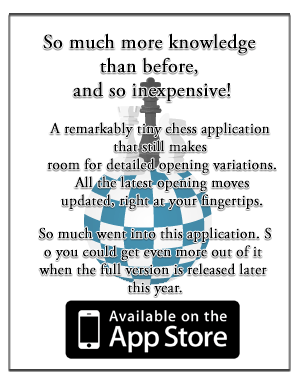January 1

BORN
Lionel Adalbert Felix Kizeritsky (1806-1853) – one of the strongest Estonian chess players of his time. While his real immortality was provided by his loss in the “immortal” game to Anderssen in London 1851.
Klaus Junge (1924-1945) – born in Chile, the most talented German chessplayer since Lasker. Came first equal with Alekhine at Prague 1942. Unfortunately, he perished during WWII. Theorist, journalist and author. The executive secretary of a legendary “Chess Moscow”– Shakhmatnaya Moskva (1957-71). The author of some books.
Roman Slobodjan (1975) German grandmaster, World Junior Champion in 1995.
Alexander Finkel (1975) Israeli grandmaster.
Luc Winants (1963) Belgian champion and grandmaster
Alexey Vyzmanavin (1960-2000) Russian grandmaster played twice for the national team 1992 and 1995.
CHESS EVENTS
1853. England. The Field published its first chess column and the British Chess Review its first issue.
–
1857. USA. First number of the American Chess Monthly
–
1868. Chess Players’Quarterly Chronicle
–
1881. England. 1st issue of the British Chess Magazine, the oldest magazine without a break. Watkinson is the editor.
–
1885. First issue of the International Chess Magazine with the world champion Steinitz as editor.
–
1893. Netherland. Dutch Federation monthly magazine Schakend Nederland founded.
–
1909. USA. Last number of the Lasker’s chess magazine is published.
–
1933. USA. First number of Chess Review with I. Kashdan as editor.
–
1990. Switzerland. A FIDE ban on smoking came into effect. Smoking was not longer allowed in the playing hall for the duration during play.
WORLD EVENTS
0045: BC Julian Calendar introduced
–
1515: Death of Louis XII, King of France
–
1531: Rio de Janerio, Brazil, discovered
–
1863: The Emancipation Proclamation, declared the previous September by Abraham Lincoln, took effect. It declared freedom for slaves in all areas of the Confederacy that were still in rebellion against the Union.
–
1901: The Commonwealth of Australia was proclaimed
–
1956: Sudan gains it’s independence
–
1958: Treaties establishing the European Economic Community went into effect.
–
1959: Fidel Castro led Cuban revolutionaries to victory over Fulgencio Batista.
–
1986: Soviet television aired a five-minute greeting from President Reagan and Americans got the same from Soviet leader Mikhail Gorbachev in the first such exchange between the superpowers.
–
1997: Kofi Annan assumed the title of United Nations secretary-general.
–
1999: The euro, the new single currency of eleven European countries, officially came into existence with the start of the New Year.
–
2002: Twelve European nations adopted the euro in the most ambitious currency changeover in history.
–
2007: Bulgaria and Romania officially join the European Union. Slovenia joins Eurozone
–
2011: Estonia becomes the 17th member of the Eurozone.
–
2014: Latvia becomes the 18th member of the Eurozone.



